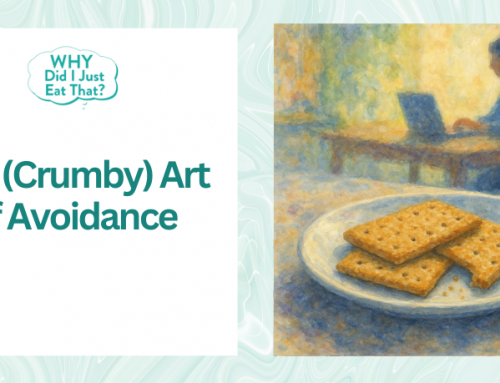
Who doesn’t love an easy, quick fix for our most pressing issues?
We have access to labor-saving artificial intelligence-generated shortcuts to help us create art and write letters. Alexa and Siri stand by with ready answers to any question. Robots vacuum the floor so we don’t have to. And of course, there are dating apps to, you know, whatever. So of course when it comes to issues like over-eating, modern science also comes to the rescue.
Only, maybe not so much.
Semaglutide medications like Ozempic or Wegovy might seem like enticing shortcuts toward resolving issues of food, body size, and appearance, but perhaps we should tread carefully. The allure of Ozempic and other drugs is rooted in their ability to tamper with the intricate workings of our appetite centers. These drugs dampen the signals that inform our hunger and fullness cues, creating a semblance of control. However, this manipulation comes at a cost. By dulling the very cues that guide our eating behaviors, semaglutide medications risk blurring the lines between our bodies’ genuine needs and a manufactured sense of satiety. What’s more, they mute intuitive voices when it comes to food, including the voices that may crave specific nutrients the body needs. The art of eating intuitively—listening to our bodies, honoring our cravings, and making conscious food choices—is founded on the delicate interplay between physical cues and psychological responses. By interfering with this intricate balance, semaglutide medications risk disrupting this critical, holistic dynamic. For example, I had a client who told me with pride that after going on Ozempic, she only ate five cookies instead of the larger number she used to eat. My concern with this is that she had those five cookies for lunch. The drug had cut down the amount but did not help at all with her eating strategy when it came to nutrition, an important aspect of one’s relationship with food.
Still… there is no Magical Solution.
While the ability to suppress one’s appetite does help diminish the exaggerated importance that food plays in the lives of some people, it does not magically lead to a balanced and sustainable relationship with food. A balanced and sustainable relationship with food celebrates the fact that food provides a whole bunch of important things: nourishment, comfort, and pleasure. People on semaglutide drugs tend to be disconnected from these benefits.
The journey toward a sustainable, balanced relationship with food isn’t merely about suppressing symptoms; it’s about working with the very emotional and psychological roots that define that relationship.
While Ozempic and others do have their place in many medically necessary situations, I see many other instances where these drugs do not. In these cases, I promote a more holistic approach, one that nurtures our capacity to understand and respond to our bodies’ needs without relying on chemical interventions. The concepts and tools I use in my book, Why Did I Just Eat That? How to Let Go of Emotional Eating and Heal Your Relationship with Food are based on the guidance I developed to help clients address the core issues that shape their relationships with food.
The Take-Away is: the Relationship with Food is Key
The fact that more than a few of my new clients want to learn how to stop using drugs like Ozempic when their goal weight is achieved is telling. Now more than ever, I am convinced that in cases where semaglutide medications are not medically called for, a more therapeutic path toward a balanced, empowered relationship with food is the right one. The trick is finding a way to navigate the complexities of one’s relationship with food with grace, wisdom, and compassion. A tall order, but one that I believe can be achievable… and well worth it!




